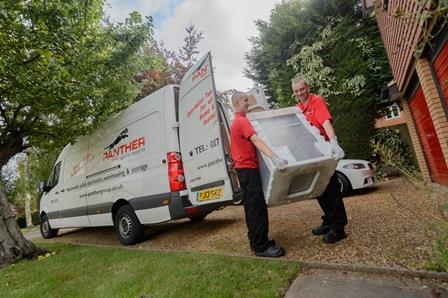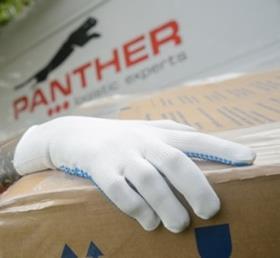
Panther is launching two new services to customers this month after a year of contract wins and the acquisition of a rival took its annual turnover close to the top of the two-man delivery food chain.
The group plans to introduce a Sunday delivery option, as well as a high-end service that its directors discovered at a home delivery show in the US. Another is in the pipeline for a later release.
MD Colin McCarthy, previously a part of the Screwfix team responsible for its £500m turnover, said the new services are part of a drive to keep Panther ahead of its customers’ needs after years of expansion.
This is a different tune to the one Panther has been forced to sing in the past; the company has faced its share of obstacles since it was founded by chairman Wilson Barrett in 1989.
Mark of the man
In its first 20 years the company dabbled in two-man delivery but focused on general haulage and logistics. “We did some two-man for Office Depot,” said Barrett, “but we didn’t make a lot of money from it, so it wasn’t an interesting path for me.”
Panther expanded to an annual turnover of about £5m, but with unpredictable profit and “people refusing to pay the bills”, Barrett oversaw a Company Voluntary Arrangement in 2008.

“He had £470,000 to pay, and over the next three or four years he paid off every penny of it, because that’s the mark of the man,” said McCarthy.
“Wilson has remortgaged his house three times over 36 years to keep this company going – I don’t think he gets enough credit for that.”
Gradually McCarthy, who started doing some consultancy for Panther in 2009, convinced Wilson to focus on the two-man delivery market and eventually abandon general haulage altogether.
“After some persuasion Will went for it. Eventually the clients [including Office Depot and Primark] that we weren’t making a lot of money from, but were working hard for, left, and at the end of 2010 we really started to push the two-man.”
Top notch service
Panther has worked hard to repair its reputation and establish itself as a two-man brand. “We’ve totally changed,” said Wilson, “We wear white gloves and boot covers, we polish the goods when we’re done, we offer installation services and leave everything in top shape.”
The transformation appears to have worked, with McCarthy predicting a £30m turnover for 2015 and £3m of EBITDA.
The company’s biggest success so far, in terms of innovation, he said, was the introduction of next day delivery; a first for the two-man market.
“The key was that it allowed businesses to differentiate and get a premium from customers by offering this unique service,” he said. “And internet retailers want their money there and then and delivered quickly, because the customer could go to the high street and change their mind.”
Over time, McCarthy said the demand for next-day delivery fizzled out because customers are increasingly concerned with choosing a specific delivery day that fits their schedule. Enter weekend delivery slots.
Living for the weekend
Panther started offering its Saturday deliveries in 2014, and now frequently sees as many orders fulfilled in this weekend slot as on an average weekday. Sunday deliveries, said McCarthy, were a natural progression.
While he is confident the market is ready for Sunday deliveries, McCarthy said he is aware of the risks it carries. “I think it will take longer to get there with this than it did with Saturday deliveries. I think Sunday is family day so it will be a cultural change.
“We’re going to launch it around the M25 and Birmingham, for maybe four to six weeks, to see how that goes,” he said.

But Craig Kavanagh, business development director and former MD of Panther’s new acquisition, Hi-Way Express, said the culture shift has already happened, in part.
“You’ve got a higher concentration of young professionals living in these areas who’ve little time and are not doing family things on Sundays, so I think it will work.”
The other service being launched this month, Concierge, is an add-on that customers can opt to pay extra for. It’s a “higher-end” service that McCarthy said “will only work for some products or customers” – namely products with healthy margins or customers willing to meet the extra costs.
“We give a 10-minute delivery window, and when we get in there we deliver it, assemble it, polish it, take all the packaging away and clean up after ourselves. We will charge extra, but no one else offers this in the UK.”
For McCarthy, meeting the needs of the end customer is top priority. “When I talk to our big clients, I’m open with them – I’m more bothered about their customers. Their customers are everything to me.
“We’re constantly focused on evolving, because we’ve got to move the business to meet the needs of retail. As customers’ choices change, we need to ensure we’re changing too and staying one step ahead of them.”
Hi-Way Express
Last year that evolution came at a high price to Panther, which despite a 56% leap in turnover to £20m, saw profits suffer an 82% drop after new contract wins demanded additional resources, and the company acquired two-man subsidiary Hi-Way Express from the Pacifica Group.
“It was struggling – we bought it for £1. It was a good purchase from a client point of view, but a bad one in terms of black holes in finances. We thought it would cost us £500,000 to put right. It cost a bit more than that, but we’re through it now.”
While it is constantly striving to stay ahead of its rivals – McCarthy places Panther second in the two-man delivery sector after Yodel’s ArrowXL – he remains reluctant to say it is leading the way.
“There’s room in this sector for everybody to have their own mark on it. I wouldn’t say we’re leading the way, but we’re always thinking about customers. And as long as we keep listening and heading in that direction, that’s somewhere we could lead.”














